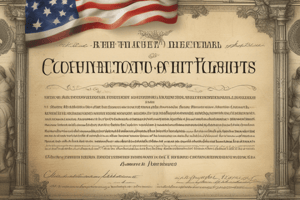Podcast
Questions and Answers
What does the 1st Amendment protect?
What does the 1st Amendment protect?
- Protection against Unreasonable Search
- Freedom of Speech (correct)
- Right to Bear Arms
- Right to a Speedy Trial
What right is guaranteed by the 2nd Amendment?
What right is guaranteed by the 2nd Amendment?
You have the right to own guns.
The 3rd Amendment allows the government to force people to house troops.
The 3rd Amendment allows the government to force people to house troops.
False (B)
What protection does the 4th Amendment provide?
What protection does the 4th Amendment provide?
What rights are embodied in the 5th Amendment?
What rights are embodied in the 5th Amendment?
What does the 6th Amendment guarantee?
What does the 6th Amendment guarantee?
What does the 7th Amendment state?
What does the 7th Amendment state?
What does the 8th Amendment prohibit?
What does the 8th Amendment prohibit?
What does the 9th Amendment imply?
What does the 9th Amendment imply?
What does the 10th Amendment state about powers?
What does the 10th Amendment state about powers?
Flashcards are hidden until you start studying
Study Notes
Bill of Rights - First 10 Amendments
-
1st Amendment: Safeguards individual freedoms such as religion, speech, press, assembly, and the right to petition the government.
-
2nd Amendment: Affirms the individual's right to possess firearms.
-
3rd Amendment: Prohibits the government from forcing citizens to quarter soldiers in their homes during peacetime.
-
4th Amendment: Establishes protection against unreasonable searches and seizures, ensuring law enforcement must have warranted justification to conduct searches.
-
5th Amendment: Guarantees rights related to criminal proceedings, including the right to remain silent, protection against double jeopardy, and the right to due process of law.
-
6th Amendment: Ensures the accused have the right to a speedy and public trial by an impartial jury, as well as the right to legal counsel.
-
7th Amendment: Grants the right to a jury trial in civil cases where the amount in controversy exceeds twenty dollars.
-
8th Amendment: Prohibits excessive bail and fines and protects against cruel and unusual punishment.
-
9th Amendment: Asserts that the enumeration of certain rights in the Constitution does not mean that others do not exist; ensures protection of unenumerated rights.
-
10th Amendment: States that powers not delegated to the federal government are reserved for the states and the people, reinforcing the principle of federalism.
Studying That Suits You
Use AI to generate personalized quizzes and flashcards to suit your learning preferences.




